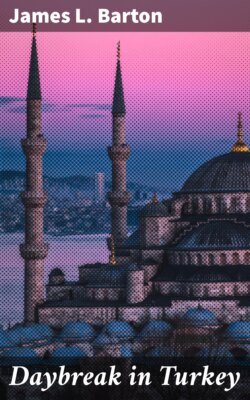Читать книгу Daybreak in Turkey - James L. Barton - Страница 10
На сайте Литреса книга снята с продажи.
V. RACE QUESTIONS AND
SOME OF THE RACES
ОглавлениеTable of Contents
The rigidity of the Sacred Law has been at times slightly tempered by well-meaning and learned Moslems who have tortured their brains in devising sophisms to show that the legal principles and social system of the seventh century can, by some strained and intricate process of reasoning, be consistently and logically made to conform with the civilized practices of the twentieth century. But, as a rule, custom based on the religious law, coupled with exaggerated reverence for the original lawgiver, holds all those who cling to the faith of Islam with a grip of iron from which there is no escape. “During the Middle Ages,” it has been truly said, “man lived enveloped in a cowl.” The true Moslem of the present day is even more tightly enveloped by the sheriat.
In the third place, Islam does not, indeed, encourage, but it tolerates slavery. “Mohammed found the custom existing among the Pagan Arabs; he minimised the evil.” But he was powerless to abolish it altogether. His followers have forgotten the discouragement, and have very generally made the permission to possess slaves the practical guide for their conduct. This is another fatal blot in Islam.
Lastly, Islam has the reputation of being an intolerant religion, and the reputation is, from some points of view, well deserved, though the bald and sweeping accusation of intolerance requires qualification and explanation. The followers of the Prophet have, indeed, waged war against those whom they considered infidels. They are taught by their religious code that any unbelievers, who may be made prisoners of war, may rightly be enslaved. Moreover, sectarian strife has not been uncommon. Sunni has fought against Shiah. The orthodox Moslem has mercilessly repressed the followers of Abdul Wahab. Further, apostasy from Islam is punishable with death, and it is not many years ago that the sentence used to be carried into effect. On the other hand, the annals of Islam are not stained by the history of an Inquisition. More than this, when he is not moved by any circumstances specially calculated to rouse his religious passions, the Moslem readily extends a half-contemptuous tolerance to the Jew and the Christian. In the villages of Upper Egypt, the Crescent and the Cross, the Mosque and the monastery, have stood peacefully side by side for many a long year.
—Lord Cromer in “Modern Egypt.”
All questions relating to the internal government of the Ottoman empire would be greatly simplified and much more easily comprehended, were the people of Turkey substantially of one race like those of China or Japan. But this is not the case. As the Moslems overran Syria, Mesopotamia, Armenia, and Asia Minor, they conquered peoples of other races than themselves and of other religions. In their wars of conquest the Mohammedans revealed a degree of toleration which is to be commended. All conquered people were asked to embrace Islam. If they persistently refused, they were conceded the right to live upon the payment of an annual tribute per capita. The acceptance of this condition was an outward recognition that the Moslems were their masters, while the money thus obtained enabled the conquerors to extend their conquests. Whoever declined to accept Islam and refused to pay the life tax was put to the sword. This left within the conquered districts only two classes, the Mohammedan rulers and those who, by annual tribute, confessed themselves to be a conquered people, permitted to live from year to year by virtue of the money paid.
It is most natural that this distinction, perpetuated for thirty generations, should lead to aggravated relations of conqueror and conquered. It was inevitable that the Moslems should become imperious and the other people depressed and subservient.
In order to understand certain governmental and religious phases of the Turkish empire, it is essential that we look a little in detail into the history and characteristics of these divergent elements of its population which together make up the populations of that country. It is a subject preeminently of races and religions. Within the empire there is only one unifying force and that is Mohammedanism. All who embrace Islam, irrespective of the race from which they sprang, become an integral part of the governing body. Such begin at once to use either the Turkish or the Arabic language and to bear the name “Turk.”
Besides this one unifying force, there is no tendency to bring together the different races or to amalgamate them. There is little intermarriage. Each race has its own language and its distinct religion. To them all religion is racial, or, as they call it, “national.” A man without a religion is beyond their conception; and under the laws of the empire he can have no place in any community or possess any rights that others are bound to respect. Each man, woman, and child must be registered upon the rolls of some national church. There his name stands, and in that record his rights inhere until he changes to Islam. Turkey allows few rights or privileges to one not a registered member of a religious community.
We will consider briefly a few of the old historical and, in some cases, once powerful races, now found in that empire, and among which mission work is carried on. Only by acquaintance with these races can we understand the real factors in the problem.
There are the many non-Moslem races of Syria, the country first overrun by the Moslem invaders as they pushed their way northward. The races who occupy that country in connection with perhaps one million Mohammedans are the Nusairiyeh, the Maronites, Greeks and Armenians, Jacobites, Druses, and Jews. The three mentioned here especially peculiar to Syria are the Nusairiyeh, the Maronites, and the Jews.
